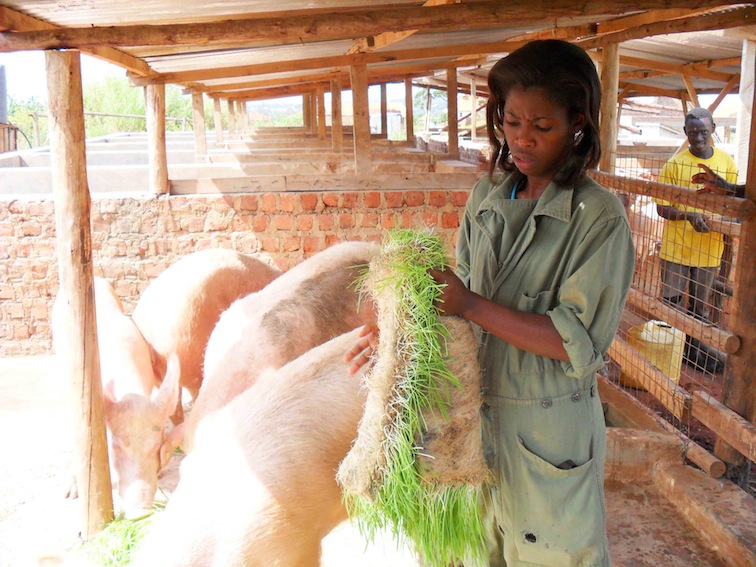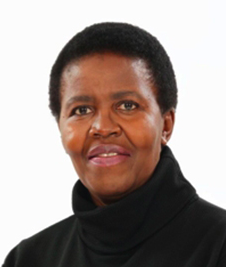Africa is the world’s youngest continent with more than half of the population under 25 years of age. Since most African countries rely on agriculture as their main source of income, involving the youth is an imperative. Experts agree that a strong involvement of Africa’s youth in rural development, agriculture and natural resources management will boost food security in the continent. However, young people remain almost invisible, which is a critical threat to food security.
Young Africans want opportunities in agri-business that other non-agriculture related businesses such as in IT, oil and gas and tourism have offered their peers. Most young people want a quick return, and they won’t be satisfied working long hours on the farm to produce just one metric ton of maize per hectare. If the output was five tons or more, then perhaps young people would get excited about a future in farming.
Using technology to transform agriculture
African youth have the power to spearhead the modernization and transformation of Africa’s agricultural sector through their interest in technological change and innovative market solutions. Agriculture is becoming a serious contender in startup circles and success is prevalent. Whether as hi-tech developers or as large-scale producers, some young Africans are starting to challenge the outdated image of agriculture.
A great example is FarmDrive, created by young innovators in Kenya, that is helping to close the large financing gap for farmers. The software helps farmers improve their record-keeping and farm performance data, enabling them to prove credit-worthiness to potential lenders, all via their mobile phones. These innovations can mobilize the energies and ambitions of young people, helping to create good jobs and reduce migration to urban areas. Those reluctant to pick up a hoe can be inspired by this new wave of tech-savvy entrepreneurs.
Market – led agriculture
African agriculture has traditionally been geared towards meeting household needs but there is now consensus that agriculture must be a business as everybody including farmers depends on the market. Promoting market-led agriculture would not only increase farmer incomes but it would also increase its appeal to the youth. There are many innovations that help farmers to aggregate their produce, thereby facilitating their access to markets. One such initiative is e-Granary promoted by the Eastern Africa Farmers’ Federation. Instead of sitting on the roadside waiting for clients, farmers organized in groups of 15 to 40 report their planted areas and expected harvest volume and date through *492# or to the EAFF call center. This information is used by the federation to inform buyers who provided the inputs to the farmers. Once the produce is sold, the platform deducts the cost of the inputs owed by each farmer and pays the balance to the farmers via mobile money.
Growing entrepreneurship opportunities along agricultural value chains also offer youth an attractive entry into the sector. AGRA’s Strengthening Agricultural Input and Output Markets in Africa (SAIOMA) project promoted youth entrepreneurship in Kenya, Malawi and Zambia through training in agro-dealership as well as provision of start-up matching grants.
For instance, Isaiah Mutwiri, 35, from Tigania West in Kenya decided to quit his job with a seed company to start selling agricultural and veterinary products without any training or experience in running a business. The business struggled, and Isiah ran into debts to keep it afloat until SAIOMA trained him in book-keeping and in practical day-to day management of his business. After engaging in demand creation activities for products, including offering extension services by visiting farmers, Isiah’s client base went from 200 clients a month to more than 400 and he opened a second shop, within two agricultural seasons.
Inclusive Finance arrangements
Improved access to mechanization plays an important role in maximizing the benefits of “AgTech” like improved seeds and fertilizers, and in attracting youth into agriculture. However, most farmers’ plots and incomes are inadequate to justify investments in mechanization. The Financial Inclusion program of AGRA has 3 partnerships in Ghana, Kenya and Tanzania to develop mechanization services provision as a business. This “Uber for Tractors” operates under names like Trotro in Ghana, TingA in Kenya, Tringo in Tanzania and hello tractor in Nigeria. This innovation offers ample job opportunities for young people in the mechanization services centers by becoming an operator or a mechanic. Alternatively young farmers can become technology-driven farmers by using services such as e-Granary, TingA, I-shamba and WeFarm.
Abundant opportunities for youth in agriculture
Clearly opportunities exist for directing African youth toward agribusiness, if done in an inclusive manner. Governments, civil society and the private sector have a role to play in developing comprehensive programs that forge widespread commitment and partnership with young prospective farmers. This effort must extend well beyond reorientation within formal training settings. It must involve the development of detailed agri-business plans and creditworthy loan applications, leading to the establishment of efficient and effective networks of new agri-business ventures and services across the entire agricultural value chain.
There are many examples of how the youth are showing the way in agriculture in different parts of Africa.
Joseph Macharia, the founder of Mkulima Young, is another example. Known as the “Facebook Farmer” in East Africa, Mkulima Young is an online platform that engages young people who are interested, inspiring and using agriculture to generate income and employment. The platform focuses on assisting youth with information, market access, and financing.
To inspire and encourage young people to see the economic appeal of agricultural ventures, Mkulima Young tells the stories of “Mkulima champions”: youth who are into agriculture as a business and earning income from it. Mkulima also has a forum where young people can ask questions and share experiences. It supports a free online marketplace, which is also integrated with the organization’s famous social media presence on Facebook and Twitter.
In Uganda, farmer-entrepreneur Emma Naluyima has been dubbed “Mama Pig” by the press for her innovative and lucrative approach to small-scale farming. Working on a plot of just one acre, Naluyima has showed how a diversified farm including livestock, fisheries, vegetable crops and even bio-gas can combine into a major economic success story. Now operating a demonstration farm, Naluyima is showing young people across Uganda that there is a future in farming that goes far beyond the simple hoes of their forebears.

Across the continent in Mali, Salif Niang and his brothers are pioneering another kind of farming future for young Africans. Together they founded Malo, a social enterprise which aims to combat farmer poverty and chronic malnutrition by working with local smallholder farmers to produce international-quality, branded rice fortified with life saving vitamins and minerals. Malo, and other start-ups like it, are showing young Africans that agriculture can be both a business and a social good.
Both Emma and Salif are part of a new crop of young Africans in agriculture who are committed to creating a new narrative about farming in Africa – telling new stories of what works, and spreading the word about opportunity. Communications programs like the Aspen Institute’s New Voice Fellowship can help to create other public champions for Africa’s agricultural future.
AGRA’s role
At AGRA, we see agriculture as an essential driver of economic development and an area of great opportunity for young people in Africa. However, we also recognize that rural youth encounter serious constraints in accessing technology, affordable finance, information, skills, land, and markets, and has formulated corrective strategies. By providing support to the governments in the eleven countries where we work, catalyzing consortiums to work in integrated agricultural market-led value chains, we believe we can increase farmer incomes and showcase that agriculture can be a competitive high income sector.
We need a collective effort
Governments cannot do anything alone, but they can lead policy development as well as influence the direction of funding flows. They need to support young people to get into agriculture and agri-business through developing and enacting appropriate policy environments, access to skills, innovations and technologies. Most governments’ existing strategies are officially oriented to promote agricultural growth and food security for the millions of their rural constituents who are small-scale farmers. However, most of these strategies assume unhindered access to land and therefore leave out the youth.
There is no doubt that migration from farm to non-farm sectors, and from rural to urban areas, will provide the brightest prospects for youth led transformation and modernization of Africa’s economies. However, it will happen only as fast as educational advances and growth in the non-farm job opportunities will allow, which in turn depend on income growth among the millions of youth who should be still engaged in agriculture.
In the words of Dr. Akin Adesina, the 2017 World Food Prize Laureate:
“Despite the challenges, more and more young Africans are waking up to the potential of agriculture. By working together, governments, businesses and funders can open more doors for them. There are youths that are gainfully engaged in agriculture. Let us seize the opportunity to create partnerships to take to scale what we already know is working. Without investing in the youth, there will be no African Agriculture to talk about in the future as the youth already constitute the majority.”
Farming First is the official media partner for the World Food Prize Foundation’s Borlaug Dialogue 2017. For more content from speakers and participants at the event, follow @FarmingFirst and sign up for our Daily Digest here.



